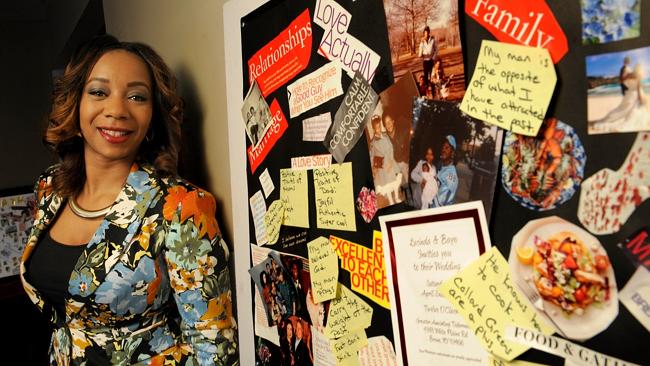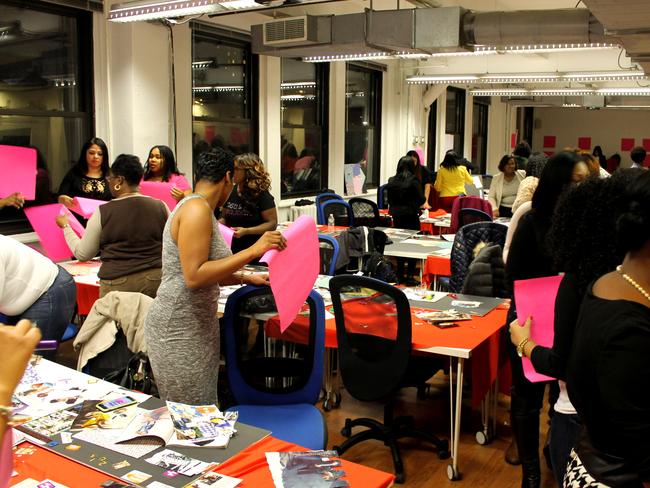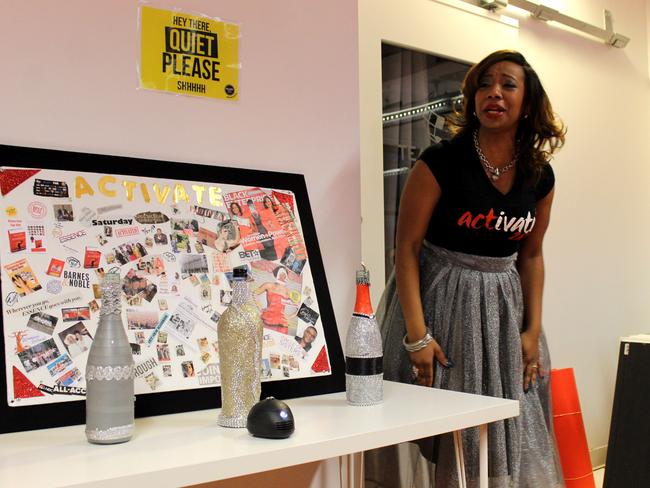From prison inmate to vision-board queen
FOR some, the road to success is paved with gold or graduate degrees. For Lucinda Cross, it started in a jail cell, and is now covered in glitter and cardboard.

FOR some, the road to success is paved with gold or graduate degrees. For Lucinda Cross, it was glitter and cardboard.
It has been a road with detours and potholes, plans hatched and revised. But if you ask where Cross got the idea for the business that would one day land her in the pages of magazines and on morning television, she’ll tell you, without shame or drama: Inspiration came to her in a jail cell.
It was the late ’90s, and Cross was serving a five-year sentence for laundering contraband for a Nigerian drug cartel. While in prison, she listened to motivational speakers like Tony Robbins and Les Brown.
“They would say, ‘What do your goals look like? Put a picture on it,’ ” says Cross, now 37 and a married mother of two.
So she put a picture on it. Several pictures, cut from magazines. She pasted together images of what she wanted after prison. College. A job. A day-care centre and an after-school program for her community in The Bronx.
While the last two visions did not materialise after she got out in 2000 — “Someone with a prison record can’t open up a day care,” it turns out — the others did. A degree from Mercy College: Done. A job as a patient-relations coordinator at a hospital: Done.

Soon, the pictures on Cross’ board had changed, and so had her focus: “I had a picture of a woman in heels and a briefcase, walking down Wall Street. Business became everything.”
That vision has served her well through the startup of her life-coaching brand, Activate Your Life Today!, which specialises in personal and professional development programs for women and at-risk youth.
She hosts workshops around the country and an annual Activate! conference. (Former The View co-host Sherri Shepherd and actress Keke Palmer participated in the most recent one.)
A primary component of Cross’ philosophy is the vision board, a cardboard poster populated with pictures, words and images of what the person making it wants to manifest in her own life.
Want a man? Cut out a picture of one, put it on the board and paste words that sum up your dream guy. Want a new job? A photo of money will get you started — but why not use a picture of a supportive, happy-looking work environment as well?
If Cross’ approach sounds familiar, it’s because vision boards are mentioned enthusiastically in the 2006 self-help bestseller The Secret, which was Oprah-approved and has sold some 19 million copies.
And while such boards are easily criticised as all glitter and no substance — pics of unicorns and 50 Shades of Grey’sJamie Dornan — Cross focuses on details.
“[Cross’] vision-board series helped me to get clearer on what I wanted for my business to take it to the next level,” says Vanessa Cunningham, a wellness expert.
“In a short amount of time, I’ve made great headway. I’m on target to launch a campaign in March called Take 15, [plus] products and programs.”

“It’s not just putting up a picture of a beautiful car,” says Cross.
“It’s: What are the steps you’re going to take to get that beautiful car? Do you have a license, and car insurance? Do you owe any parking tickets? How’s your credit? It’s about preparing you for ... owning this car when the opportunity comes.”
At her vision-board parties — which cost between $US40 and $US100 ($AU52-$AU131) per student and tend to sell out — Cross is met with enthusiasm from a crowd (typically 75-150 people) that tends to be female and professional. But at her workshops at grad schools and finance and law firms, she sometimes encounters resistance.
“I did one for a group of medical students and I said, ‘You guys are so uptight! OK, what are you all obsessed with?’ They said, ‘This test we all have coming up.’ So, OK, fine. Let’s put the score you want up on your vision boards, and then move on. When’s the last time you took ... a vacation? Put that up on the board!”
To the sceptics, she has this to say:
“Whether you look at it from a spiritual or scientific aspect, this world is a huge vision board. Everything that’s here is because it started as an image someone had in their mind. You want to call it a blueprint, or a business plan? Fine. But first, they had to think about it and draft it. So a vision board? It’s like selling our own ideas to ourselves.”
This article originally appeared on The New York Post.



